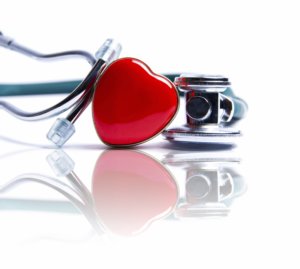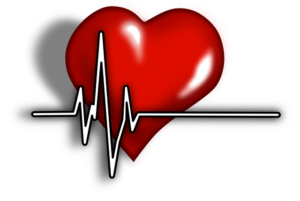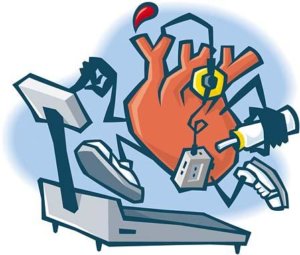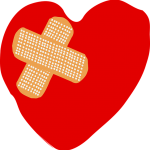
Below you’ll find the most common heart conditions and how to prevent them.
Heart attack
A heart attack, also called a myocardial infarction, is a life-threatening condition in which blood flow to the heart is suddenly blocked. During a heart attack, the heart muscle is robbed of oxygen and nutrients and begins to die as a result.
The most common cause of a heart attack is a buildup of fatty deposits from ‘bad’ cholesterol that accumulates inside the coronary arteries and forms plaque. When a piece of the plaque breaks off, a blood clot forms and blocks off the narrowed artery, inhibiting blood flow to the heart.
If you think that you or a loved one may be experiencing a heart attack, seek immediate medical attention. Look out for these common signs and symptoms of a heart attack:
- Pressure, tightness, squeezing, or aching sensation in your chest, arms, neck, jaw, or back
- Nausea, indigestion, heartburn, abdominal pain
- Shortness of breath
- Cold sweat
- Fatigue
- Lightheadedness or dizziness
High blood pressure

High blood pressure is known as the “silent killer” because there are no symptoms or signs and long-term, it increases the risk of heart disease and stroke.
The good news is that high blood pressure can be easily detected, and with lifestyle changes and medication when necessary, it can be controlled. Make sure to attend regular physicals and have blood pressure checked each time.
Coronary artery disease
Coronary artery disease (CAD) is the most common heart condition and the leading cause of death in the United States. It happens when the major blood vessels that supply blood to the heart, which are the coronary arteries, become damaged or diseased. CAD is usually caused by a buildup of plaque on the inner walls of the arteries due to high cholesterol levels over a long period of time.
Many heart conditions, including heart attack, heart failure, and arrhythmias, happen as a result of coronary artery disease. In fact, many people are not aware that they have CAD until one of these incidents occurs.
Signs and symptoms of CAD to look out for include:
- Chest pain (angina). This is tightness of the chest that is usually triggered by physical or emotional stress.
- Shortness of breath. This is a sign that the heart cannot pump enough blood to support all systems in the body.
- Heart attack. Many times, a person has no idea that he or she has CAD until a heart attack occurs.
Cardiomyopathy

Some people never have signs and symptoms of cardiomyopathy until heart failure occurs. Others may experience symptoms in the early stages of the disease. When signs and symptoms do appear, they most commonly include:
- Shortness of breath, especially with physical exertion
- Fatigue
- Swelling of the legs, ankles, and feet
- Cough while lying down
- Heartbeats that feel rapid, pounding, or fluttering
- Chest discomfort
- Dizziness or lightheadedness
Vascular disease
Vascular disease includes any condition that affects the arteries or veins. There are many different types of vascular diseases, and they can lead to all kinds of different conditions depending on which blood vessels are affected.
When the arch branches, which are the vessels that supply blood to the brain, are diseased, a person is at risk of stroke. When the coronary arteries are affected, the person is at risk of heart attack. If the renal arteries become damaged, a person may have high blood pressure or kidney failure.
Vascular diseases are a major cause of death and disability. They can lead to the following conditions:
- Atherosclerosis (plaque buildup inside blood vessels)
- Stroke
- Blood clots
- Peripheral artery disease
- Aneurysms
- Hypertension
- Pulmonary embolisms
How to avoid heart conditions
There are many different types of heart disease, and fortunately, most of them can be prevented. While there are some risk factors that cannot be changed, such as age, sex, race, and family history, there are plenty of lifestyle changes that can be made to lower the risk of the common heart conditions mentioned above.
Preventing heart disease begins with understanding risk factors and making healthy lifestyle changes to reduce those risks. The majority of heart attacks and strokes are avoidable through simple, positive actions. These include maintaining a nutritious diet, staying physically active, and avoiding smoking.
Quit smoking
Smoking harms blood vessels throughout the body, including those connected to the heart and brain. This increases the risk of serious health issues, making a person two to five times more likely to die from a heart attack, twice as likely to die from a stroke, and three times more likely to experience sudden cardiac arrest. Quitting smoking is widely considered one of the most effective steps an individual can take to improve heart health and protect the well-being of those around them.
Follow a heart healthy diet
The type and amount of food a person consumes can influence their heart health. Diet plays a key role in affecting risk factors for heart disease, including cholesterol levels, blood pressure, diabetes, and body weight. Following a heart-healthy diet is one of the most effective ways to lower the risk of developing heart disease.
A heart-healthy diet focuses on long-term, sustainable habits rather than labeling foods as strictly “good” or “bad” or following rigid diets. It emphasizes reducing unhealthy fats, salt, and added sugars while incorporating more whole grains, fiber, vitamins, antioxidants, and healthy fats. The goal is to make gradual, consistent choices that support overall heart health over time.
Increase exercise
A lack of physical activity significantly increases the risk of developing serious health conditions such as heart disease, Type 2 diabetes, and osteoporosis. Engaging in regular exercise or physical activity can significantly reduce the likelihood of experiencing a heart attack or developing heart disease. Staying active also plays a key role in managing risk factors for heart disease, such as high blood pressure, high cholesterol, and excess body weight.
Regular physical activity can increase energy levels, strengthen bones and muscles, and improve mood by promoting relaxation and happiness. Setting small, achievable goals is a good way to begin, gradually working up to 30 to 60 minutes of moderate-intensity exercise on most days of the week.
Stay within a healthy weight range
Excess weight or obesity is associated with a higher risk of developing various health issues, including heart disease. It can contribute to conditions such as high blood pressure, elevated cholesterol levels, type 2 diabetes, and the accumulation of fatty deposits in the arteries. These factors significantly increase the likelihood of experiencing a heart attack.
Maintaining a healthy waist size is important, with less than 31.5 inches recommended for women and 37 inches or less for men. Losing weight can be challenging and requires both time and dedication. The most effective approach involves gradually improving eating habits and increasing physical activity. For those who find weight loss difficult, they may benefit from supplements to aid with weight loss or even weight loss medications.
Avoid alcohol
Excessive alcohol consumption, including heavy or binge drinking, can significantly raise the risk of heart disease. Over time, drinking large amounts of alcohol may lead to an elevated heart rate, higher blood pressure, a weakened heart muscle, and increased levels of triglycerides, a type of fat in the blood.
Drinking alcohol should be done in moderation to reduce the risk of harm. To reduce alcohol intake, individuals can alternate alcoholic drinks with low-calorie beverages such as plain mineral water, light beer, or low-alcohol options.
Manage cholesterol
Cholesterol is a type of fat that circulates through the bloodstream and plays a necessary role in keeping the body functioning properly. However, when cholesterol levels become too high, it can lead to serious health risks. Excess cholesterol in the blood is considered a major factor contributing to heart disease.
Excessive levels of bad cholesterol can be dangerous as it tends to cling to artery walls, leading to the formation of fatty plaques. Over time, these plaques can block arteries, increasing the risk of heart attacks or strokes. Lifestyle changes, such as adopting a healthier diet high in fiber and low in saturated fat, can play a key role in reducing cholesterol levels. In some instances, a doctor may also prescribe medication to help manage high cholesterol more effectively.
Treat diabetes
Individuals with diabetes often face a higher likelihood of developing additional heart disease risk factors, including high blood pressure, elevated cholesterol levels, and obesity. Controlling diabetes or reducing the risk of developing it plays a key role in preventing heart-related complications. This typically requires adopting healthier eating habits, increasing physical activity, and, in many cases, using medication to manage blood sugar levels effectively.
Take care of your mental health
Mental health encompasses a range of conditions, including common issues like anxiety and depression, as well as more serious disorders such as major depressive disorder and bipolar disorder. Certain mental health conditions, like depression, can significantly raise the risk of heart disease, comparable to the risks associated with smoking or obesity.
Taking care of mental health plays a key role in maintaining heart health. Positive mental health involves prioritizing emotional well-being and effectively addressing any symptoms or challenges.
FAQs
How to avoid heart conditions?
To prevent coronary heart disease, it’s important to live a healthy lifestyle. Start by eating a balanced diet and staying physically active, which can help you maintain a healthy weight. Avoid smoking and limit how much alcohol you drink, as both can increase your risk. Keeping your blood pressure and diabetes under control is also essential, so follow your doctor’s advice and take any prescribed medications. These steps can go a long way in protecting your heart health.
Which types of common heart conditions can be prevented?
Cardiovascular disease (CVD) can often be avoided by managing risk factors early. These include smoking, poor eating habits, obesity, lack of exercise, excessive alcohol use, and exposure to air pollution. Taking steps to address these issues can help prevent serious health problems later on.
What is the #1 worst habit for your heart?
Smoking is extremely harmful to heart health! The Centers for Disease Control and Prevention (CDC) reports that smoking is responsible for about one in four deaths caused by cardiovascular disease.
Can stress cause heart disease?
Research shows that long-term stress can lead to high cortisol levels, which may raise cholesterol, blood sugar, triglycerides, and blood pressure, all of which increase the risk of heart disease. Stress can also trigger changes that cause plaque to build up in the arteries, further affecting heart health.
What is a heart-healthy diet?
The recommendation is to include plenty of vegetables, fruits, and whole grains in your diet. It also suggests eating fish, poultry, legumes, nuts and seeds, extra virgin olive oil, and low-fat or fat-free dairy products. At the same time, it’s important to limit foods that are high in saturated fats and sodium.



















